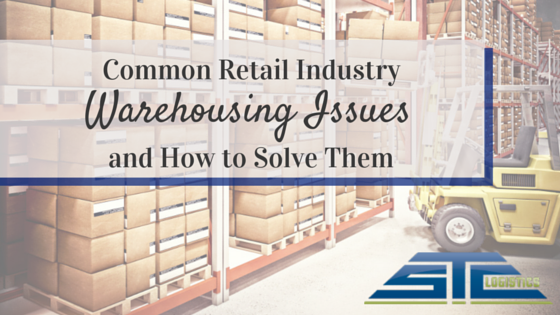Common Retail Industry Warehousing Issues and How to Solve Them

Warehouses are commonly used by retail businesses to store items that have been shipped to them but have not yet been moved into stores. In addition to retailers, transport businesses, manufacturers, customs, importers and exporters use warehouses as well. They may be designed to house goods of a certain type; perishable goods, for instance, are stored in refrigerated warehouses. They may be used to assemble containers for export or prepare consolidated shipments for distributions.
Despite the tremendous value warehouses provide for companies, some issues cannot be avoided altogether. In this article, we will look at some of the most pressing retail warehousing issues and how they may be solved, avoided or minimized.
Top Retail Warehousing Issues
1) Not having enough space
The amount of storage space needed for a company depends on the size and quantity of goods to be stored and length of time which storage is required. Companies aim to rent or purchase warehouses that have enough space to meet their needs, but sometimes end up ordering more merchandise than their space can accommodate or under estimating the length of time necessary. More often, the issue of space occurs as a consequence of inadequate organizational practices, such as not making efficient use of the available space or experiencing delays in implementation of goods at final destinations. Such poor organization leads to time and money being wasted on unnecessary labor and square footage.
To ensure adequate warehouse organization, a company should contract with warehouses and 3pl companies that understand the parameters of retail warehousing requirements. This way, less time will be spent locating items and in turn expedite the actual shipping process, such as using expedited logistics services. The machines used in loading and unloading should also be taken into consideration since they, too, are typically stored on-site. Counter balance machines are not very good for retail warehousing and should be rejected in favor of narrow aisle reach trucks and multi-directional forklifts, which can increase storage space by thirty and forty percent respectively.
Another important element of space management in retail warehousing is to have the place thoroughly evaluated by a professional forklift business. This can further maximize storage space. It is essential to have a facility that understands retail needs and can provide flexibility.
2) Slotting
When looking for slots to store items that have just arrived, forklift trucks often make one trip after another while scouring for space around the warehouse, wasting gas or electricity. As a result, they often end up putting their loads into the first empty slot across which they come, again resulting in disorganization. The last thing that any retail business needs or wants is disorder; they need to know exactly where something is so their customers will not have to wait for inventories to be replenished or for new products to launch.
There are numerous types of storage racks, and good retail warehouse practices involve knowing what they are and the purposes for which they may be used; these include:
- cantilever
- double deep
- drive-in
- powered mobile
Companies can also plan the use of slots, taking into account special needs for certain items as well as supply needs.
3) Discrepancies in inventory, not picking fast enough
Another common warehousing problem occurs when too much time is spent on each item because of poor management practices. When scanned mechanically, barcodes can reduce handling time for merchandise, providing order and ease of access. For larger items and fixture or displays, pallets can be color coded in order to group together specific store configurations or marketing campaigns, thus allowing design teams to have easy access.
In conclusion, retail freight logistics and retail warehousing depends, more than anything else, on organization. With everything in its proper place and employing proper accounting and moving machines, retail warehousing can be vastly simplified, to everyone’s great satisfaction.
STC Logistics specializes in nationwide retail logistics solutions and warehousing services. We ensure not only that your items arrive on time and undamaged with our expedited logistics services, but are stored safely and scheduled with cost-efficiency and reliability. To learn more about our retail freight logistics solutions, click below.










